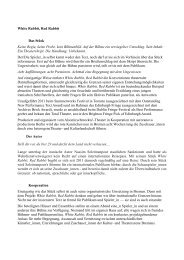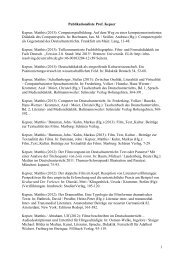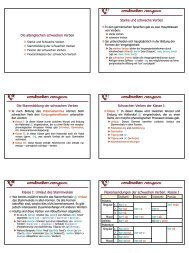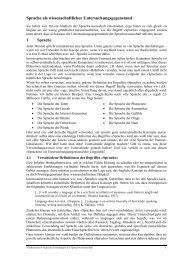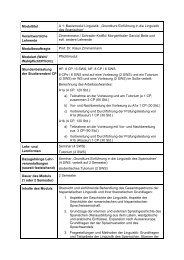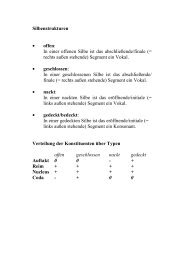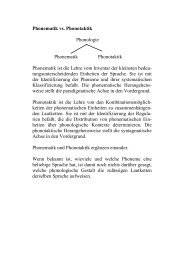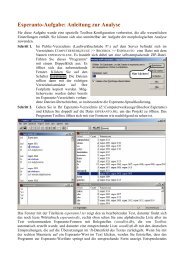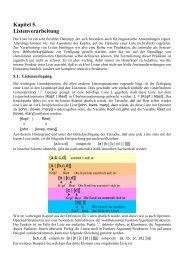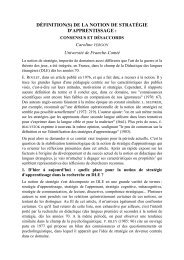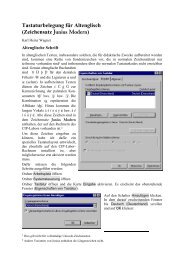Relativism and Universalism in Linguistics - Fachbereich 10 ...
Relativism and Universalism in Linguistics - Fachbereich 10 ...
Relativism and Universalism in Linguistics - Fachbereich 10 ...
You also want an ePaper? Increase the reach of your titles
YUMPU automatically turns print PDFs into web optimized ePapers that Google loves.
150 Workshops<br />
“Hmoob Boy Meets Hmong Girl,” a short play, takes a more playful approach to the situation,<br />
show<strong>in</strong>g the young woman as preferr<strong>in</strong>g what is portrayed as an Anglo-American cultural<br />
response to an <strong>in</strong>vitation to dance, sarcastic refusal. The male character <strong>in</strong> the play, on the<br />
other h<strong>and</strong>, takes an ultra-mascul<strong>in</strong>ist approach, which he presents as traditional Hmong. The<br />
story <strong>and</strong> the play show that <strong>in</strong>vitations from men may still constitute a face threat to<br />
young Hmong women, <strong>and</strong> that the verbal tools available to them as responses are not so<br />
different from those their gr<strong>and</strong>mothers used.<br />
References<br />
Blum-Kulka, Shoshana, Juliane House <strong>and</strong> Gabriele Kasper. (1989a). Investigat<strong>in</strong>g Cross-<br />
Cultural Pragmatics: An Introductory Overview. In S. Blum-Kulka, J. House <strong>and</strong> G.<br />
Kasper (eds.) Cross-Cultural Pragmatics: Requests <strong>and</strong> Apologies, pp.1-34. Norwood,<br />
NJ: Ablex.<br />
Brown, Penelope <strong>and</strong> Stephen Lev<strong>in</strong>son. (1987). Politeness: Some universals <strong>in</strong> language<br />
usage. Cambridge: Cambridge University Press.<br />
Burt, Susan Meredith. (2005). How to get rid of unwanted suitors: Advice from Hmong-<br />
American women of two generations. Journal of Politeness Research, 1 (2): 219-236.<br />
Donnelly, Nancy. (1994). Chang<strong>in</strong>g Lives of Refugee Hmong Women. Seattle: University of<br />
Wash<strong>in</strong>gton Press.<br />
Thoj, Va-Megn. (2002). Hmoob Boy Meets Hmong Girl. In Mai Neng Moua (ed.) Bamboo<br />
among the Oaks: Contemporary Writ<strong>in</strong>g by Hmong Americans. St. Paul: M<strong>in</strong>nesota<br />
Historical Society Press.<br />
Vang, Ka. (2006). The Good Hmong Girl. Paj Ntaub Voice 11, 1: 89-<strong>10</strong>7.<br />
The expression of gratitude <strong>in</strong> IsiXhosa educational contexts<br />
Dlali, Maw<strong>and</strong>e<br />
Stellenbosch University, South Africa<br />
mdl@sun.ac.za<br />
Express<strong>in</strong>g gratitude is a language function that has important social value <strong>in</strong> any language<br />
<strong>in</strong>clud<strong>in</strong>g Xhosa. The expression of gratitude is commonly used <strong>and</strong> is <strong>in</strong>fluenced by the<br />
relationship between the giver <strong>and</strong> the receiver. The language function of express<strong>in</strong>g gratitude<br />
is used frequently <strong>and</strong> openly <strong>in</strong> a wide range of <strong>in</strong>terpersonal relationship, i.e. among<br />
<strong>in</strong>timates, friends, strangers <strong>and</strong> with superiors <strong>and</strong> subord<strong>in</strong>ates. If properly used, the<br />
expression of gratitude can engender feel<strong>in</strong>gs of warmth <strong>and</strong> solidarity. Inappropriate<br />
expression of gratitude can have negative consequences, sometimes result<strong>in</strong>g <strong>in</strong> sever<strong>in</strong>g the<br />
relationship of the speaker <strong>and</strong> listener.<br />
The ma<strong>in</strong> aim of this paper is to exam<strong>in</strong>e whether Brown <strong>and</strong> Lev<strong>in</strong>son’s (1987) politeness<br />
theory would map onto another type of verbal behavior, namely express<strong>in</strong>g gratitude. This<br />
study will look at the expression of gratitude consequent to an action. When a person (a<br />
receiver) receives a benefit from another person (a giver), he or she usually says someth<strong>in</strong>g to<br />
express his or her feel<strong>in</strong>gs of gratitude. The expressions are diverse. They are considered to be<br />
<strong>in</strong>fluenced not only by the relationship between the giver <strong>and</strong> the receiver, but also by the<br />
characteristics of the giver’s benefit<strong>in</strong>g behavior. It is thus expected here that the imposition is<br />
on the giver.<br />
Situations <strong>in</strong> which gratitude is expressed <strong>in</strong> response to receiv<strong>in</strong>g reward, gift, favor, service<br />
<strong>and</strong> compliment will be <strong>in</strong>vestigated. The <strong>in</strong>vestigation here will analyze a range of gratitude<br />
expressions <strong>in</strong> Xhosa.



